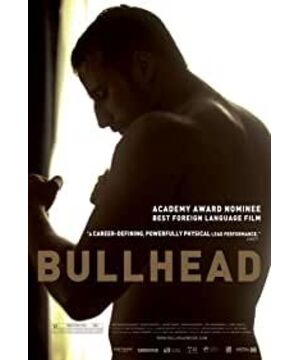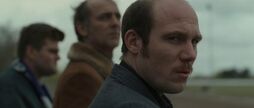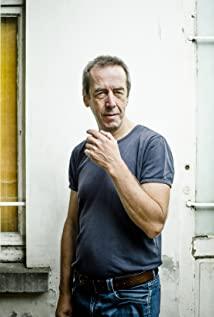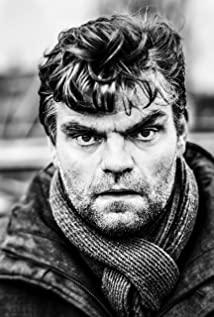The story is complicated and the atmosphere is gloomy. Films that have both of these tend to have no gaps in channeling emotions, which will cause many people to stay away. Even if they watch it, they are just on the sidelines, and then calmly raise some questions. I'm sorry I got caught in a negligence, I think I have a strong ability to resist depression on the screen, but I still see my heart broken and I can't sleep. In fact, it's just that door. Once you go in, it's the right time and place in the movie. If you can't get in, you still have doubts no matter how serious you are. In this sense, a film with a rating of 6 to 7 is likely to be a classic for certain people.
The cornerstone of the film's power is a story full of agenda setting. In fact, the big and small events are nothing more than revolving around the two lines of the male protagonist Jacky's work (cattle) and life (friendship, love). Opposites collide. In the film, this contrast is vividly expressed in Jacky's strong body due to taking hormones to maintain his sexual characteristics and his inner memory, desire and insight into the world around him.
When I read it, I thought of a sentence of Borges: forgetting is the only revenge, and forgetting also means forgiveness. The only possible revenge is forgetfulness, oblivion. Oblivion makes forgiving. I feel that there is no good word in Chinese that can express the charm of the word oblivion. In fact, it should not just be forgetting in the mundane sense, but rather a void that is forgotten and forgotten, limbo. Because things that need to be forgiven in the end cannot be deconstructed with morality and common sense, and only a contract-style overhead state can be sought.
In this movie, Jacky's tragic childhood is completely random. He can't find a reasonable explanation for the consequences that affect his life, so he tries to suppress that memory and builds such a void in the small village's cowshed.
The tragedy is that the parties did not forget, and neither did the bystanders. This unilateral reconciliation burst at the moment when the witnesses saw it more than ten years later, and the painful memory rolled back into the minds of the two parties, hinting at each other, and then spreading to more people, and their personal relationship with them. Thoughts collide again, becoming an irreversible vicious circle.
The story itself is very exciting, the filming is also interesting, the rhythm is well controlled, and the language of the shots has a kind of inaction sharpness. A very impressive scene is when Jacky sees Diederik again in a tavern in the old town, who witnessed everything at a young age but chose to retreat. He had just knocked out his accomplice who had said the wrong thing on the table and walked up to Diederik angrily, only to smack him lightly on the forehead twice. On the human level, the touch of the forehead is a kind of ambiguous emotional communication; in the world of cattle, such confrontation is the only way to attack. Jacky's full-bodied anger is still clearly visible in the forbearance, but he controls the strength of venting, and at that moment allows the viewer to appreciate the game between the two sides of the man and the beast in him.
In the story before and after, we see the protagonist struggling and making choices time and time again. These choices are correct in the ordinary sense. For example, when he had the opportunity to avenge the evil deeds he suffered in childhood, he chose to let the perpetrator go. For example, he simply loved and pursued the perpetrator's sister. Maybe he understands a truth, if this step is wrong, all the previous efforts will be in vain.
From birth, old age, sickness and death, to gossip, all experiences are deeply or shallowly engraved on the body and memory. Buried, blown away by the wind, and rotten by the rain, it affects our bodies and becomes a series of emotional ripples in the long river of time, occasionally pouring back into the nasal cavity, the suffocation is almost eternal.
Even if it is as simple as an animal, it is impossible to lose the almost intoxicated sensitivity to trauma, and it is futile to try to pass this pain on in hurting others. Jacky must have bullied a lot of people like he bullied the cattle dealer in the beginning, and he must have fed his cows a lot of banned additives. But if you hurt this thing, you can't get more and less to make up for it. This is the brilliance of human nature and the excuse of animal nature. If he had never been involved in this illegal business, he would not have been violent everywhere with the reputation of the underworld, and he would not have fled with a guilty conscience, he deserved it. But on the other hand, it is possible for the person who understands the truth and gives him understanding to eventually obey his animal instincts, and push him step by step into the abyss for the sake of his own life.
In the end, Jacky, like many of the victims around us or ourselves, didn't want and couldn't get more than sympathy.
This film is like the works with low ambient temperature that I have always liked. Instead of consoling and preaching, it writes down one question after another in black and white. Each question is a self-contradictory knot, and it lives and dies with human nature. .
View more about Rundskop reviews











